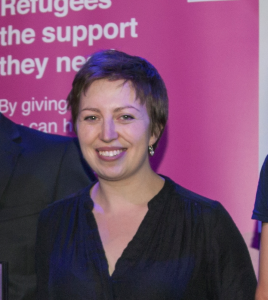“I’ll look back on these months as some of the best”
If you want to work as a journalist, you should probably do the NCTJ training. I strongly believe this now, though a couple of years ago I would have found such a statement profoundly annoying.
If you want to work as a journalist, you should probably do the NCTJ training. I strongly believe this now, though a couple of years ago I would have found such a statement profoundly annoying. Then I felt, broadly, that because I was into ‘new’ or alternative media, had done some training on defamation, and had a knack for writing, I was doing fine. And it would have annoyed me even more because it’s unfair – few can afford the fees for postgraduate or even diploma training. I certainly couldn’t.
But more and more I began to feel I needed a better (or, any) grounding in the ins and outs of the profession I was committed to. Particularly as I wanted, one day, to work as an investigative journalist. How could I ask a source to trust me without knowing the legal protections, or lack of them; how could I follow a court case, or know what I could report from court, without knowing the rules?
I looked around at postgraduate courses – the traditional route for most of the journalists I admired or was inspired by – and found a brick wall. I had a minuscule income, whacking overdraft and student loan debts. I was, at this time, applying for all and anything, and got through to the final four for a Dispatches internship. But it was the Journalism Diversity Fund that got me to college.
It wasn’t an easy route, to be honest. I was so bowled over by the idea that there was a fund out there that might cover both loan and living costs (most don’t, meaning they’re only really useful if you have cash already) that I applied for all the costs of a postgraduate year in Northern Ireland. Thinking I had got the bursary, I was over the moon, and it wasn’t until I was in Belfast, having put a deposit on a room and met the faculty staff, that I re-read the letter and realised it would pay fees only. It was a massive blow and I wandered round Belfast in a fog, before getting the ferry back to Scotland, where I’d already left my job and tenancy. I re-applied to the fund for a college course in England, where I could get a loan, and spent three months waiting to hear back while I subsisted on friends’ couches and kindness, and hitchhiked round the Highlands working on farms. I suppose it was a useful time in some ways, but a very uncertain one. Eventually it all came together, and in January I moved south to begin five very intense months at the City of Liverpool College.
Court reporting and law were the best classes. It was interesting to learn about the famous cases and constant tension between the public right to know and an individual right to privacy. I also enjoyed shorthand but I think I was alone in that. We did several hours of shorthand every day, in order to get up to 100wpm, and it was tough, but it’s so useful now that I work on a local paper – especially in court. I’d be lost without it. Plus it’s kind of cool, for someone who’s always been fascinated by codes and secrets and writing systems.
Learning the basics of how local and national government works, what all the different oversight bodies and watchdogs and quangos and so on really do, was incredibly useful. I was fairly sure I’d go back to Scotland so I set myself the probably unwise task of learning both English and Scottish public affairs (FYI, the textbook’s Scottish section is, er, wildly inadequate. Surely needs its own book!). One of the best things about the course was the sheer amount of time you have to spend with your classmates. We became close friends and could really support each other. I’d once considered doing the NCTJ long-distance, and am so glad I didn’t. I can’t imagine trying to deal with that volume of work on my own. You learn so much from other people too. And of course I got to temporarily adopt Liverpool as my home, the best city in England. I know I’ll look back on these months as some of the best, so I’m really very grateful to the JDF for that chance.
Everyone should be able to do this training. Journalism is still massively dominated by people from wealthier backgrounds. It can be so disheartening, if you have always lacked those ‘resources’, to browse through the LinkedIn pages of people currently in your dream jobs and read ‘private school, Oxford’, over and over again. More than half of the leading print journalists went to Oxbridge, despite less than 1% of the population being Oxbridge graduates. Access to newsroom jobs too often hinges on unpaid internships and contacts, rather than merit. The Journalism Diversity Fund alone can’t solve this structural problem, but it does help considerably. The idea to begin placements at the New Statesman for JDF recipients was a brilliant one – well done, Joe Smith – and I got a lot out of my week there.
The multiple crises facing journalism can only be met with more and more well-trained, committed and diverse new people coming into the profession. So let’s hope the JDF goes from strength to strength.


